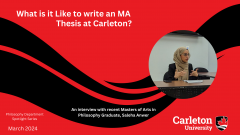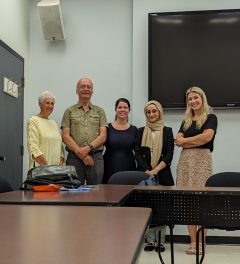
What is it Like to write an MA Thesis at Carleton?
Meet Saleha Anwer, a graduate of Carleton’s MA program in Philosophy (2023).
We sat down with Saleha to discuss her journey through the MA program, her timely thesis on Hegel and cancel culture, and how she approached the challenge of writing her thesis while also being a new parent.
What brought you to study philosophy and pursue an MA in philosophy at Carleton?
Anwer: Before I chose to pursue an undergraduate degree in Philosophy, I was going through a personal loss and reading books on dealing with loss. I wanted someone to explain some of the more complex ideas I was trying to understand, and I realized there was only so much that I could get out of reading on my own. I found inspiration in a suggestion Victor Frankl makes in his book Man’s Search for Meaning that rather than trying to find answers, you should try and find the right direction for your thought and studying philosophy was the direction I decided to go in.
Having completed my BA at Carleton in Philosophy, I was very blessed to engage with Professor Koggel and Professor Larivée who encouraged me to continue to head down a direction for learning. I came to the BA program for my own personal learning, and I thought, “I have this amazing opportunity in a master’s program to learn about a topic that can be personalized to my needs.” In trying to find reading material on cancel culture, I was never satisfied by what I read, and this ultimately led me to the MA program at Carleton.
You developed your thesis topic first in the context of Professor Koggel’s MA research seminar and then with your thesis supervisor Professor Bruff. Could you describe the process of developing your ideas in collaboration with your peers and with the guidance of these two professors?
Anwer: With Professor Bruff, I started by doing an expansive reading of Hegel on everything that was relevant. With Professor Koggel, I spent time consuming the relevant literature we found on cancel culture. Both of them did incredible work helping me stay organized, write and research concisely, and work towards a plan. Professor Bruff also gave me the incredibly helpful advice to, “Write badly”. This helped me get out of the paralyzing writer’s block/research pit that can be easy to fall down.
 You chose to write your thesis on “Can We Still Read Heidegger?: A Hegelian Response to ‘Cancel Culture,'” a topic which is quite original and timely. Why focus a philosophy thesis on cancel culture? And what led to you to choose a Hegelian lens to tackle this issue?
You chose to write your thesis on “Can We Still Read Heidegger?: A Hegelian Response to ‘Cancel Culture,'” a topic which is quite original and timely. Why focus a philosophy thesis on cancel culture? And what led to you to choose a Hegelian lens to tackle this issue?
Anwer: Honestly, I was just interested in the topic itself. I noticed that when people did similarly problematic acts, there was inconsistency in how I would sometimes give one person a “pass” and feel that the other person deserved “cancellation”. Noticing my own moral inconsistency led me to explore the philosophical notion of cancellation. I picked Hegel because he seemed, from my initial research, to be a critical philosopher discussing dialectics in a detailed way.
One of the advantages of Carleton’s MA in philosophy is that it allows students to take individual tutorials on topics of special interest. You did an MA tutorial on Hegel’s dialectics—a notoriously difficult topic! Was the tutorial format helpful to prepare for your thesis? Could you describe one or two memories that stand out from the tutorial?
Anwer: Designing my own tutorial was my favourite part of the MA. I was very nervous when I found out I would be the only one in the tutorial, but now I really appreciate how I was able to get one-on-one attention and we were able to focus the whole tutorial on the Hegel part of my thesis.
One of the memories that stands out for me is meeting with Professor Bruff at the Starbucks in Byward market and coming to her with most of the reading she assigned me underlined and highlighted with large question marks around them. I loved when Professor Bruff pulled out her own battered and highlighted copies of the readings. We would sit and I would read parts and explain to her what I thought it meant and then she would patiently explain what each and every line meant. One other memory that stands out for me is trying to read about the civil society in Hegel while writing my final paper for the tutorial and literally crying because I had pregnancy nausea and I also caught covid. I vividly remember wondering what possessed my past self for voluntarily deciding to work on this material.
Several top philosophers have been publicly shamed for abusive behaviour and ‘cancelled’ in recent years (e.g., Searle, Pogge, McGinn, even Foucault). You chose Heidegger as a case study. This philosopher’s turn towards Nazism has generated a lot of heated discussion amongst philosophers in the past decades. What specific problems does the cancellation of philosophers pose in your view?
Anwer: It is important to engage with philosophers’, ideas in order to disagree with them, rather than try to cancel them, because ideas can always resurface. If there is not a coherent methodology on how to approach dangerous ideas, then it could have adverse effects on the whole of society. Emil Fackenheim did a good job of engaging with Heidegger’s ideas, rather than simply dismissing them. He argued in a very methodical and philosophical way that Heidegger’s Theory of Being could fall prey to extremist ideologies, long before the discovery of the Black Notebooks. And this critique I feel is far more powerful than trying to remove Heidegger from philosophy syllabi.
My thesis focuses on developing a methodological approach, informed by Hegel’s dialectics, to approaching philosophers like Heidegger. Whether their ultimate cancellation is justified or not is not the focus of my research. My thesis is also not meant to encourage unlimited free speech on topics like these, or anyone in general. I attempt to construct the philosophical underpinnings of how opposing philosophical perspectives – including sometimes disturbing perspectives – interact. Following a Hegelian methodology, our role as philosophers involves engaging with the content of Heidegger’s works, as the philosopher’s task is to challenge paradoxes and conceptions rather than dismiss or exclude them.
Although your thesis deals primarily with the cancellation of philosophers, has your research influenced how you view issues of ‘cancellation’ in broader society? For instance, is there one insight that you think could be applied to the cancellation of social media ‘influencers’ or celebrities?
Anwer: In examining the possible cancellation of philosophers, I dealt primarily with thinkers who have passed away. This allows me to focus on and engage with the ideas perpetuated by these philosophers. It is important to know that the dialectical method I propose can be problematic if it were to be applied to the work of people in the now. For example, there are some ideologies – or people – that genuinely cause a significant amount of harm to other people and abuse their power. The methodology is easier to apply to long-dead philosophers when the harm is not actively ongoing by the concrete person in the here and now. In other words, it is easier to engage with Aristotle and his discussion of slavery today, in relation to his complete corpus and historical context, than it would be to engage in a Hegelian dialogue with those involved in genocide in 2024.
 What type of mistakes should never be forgiven? Is there room for people in the public eye to make a mistake, especially in their youth, and learn from it and move on?
What type of mistakes should never be forgiven? Is there room for people in the public eye to make a mistake, especially in their youth, and learn from it and move on?
Anwer: I think that there is always room for people to grow and improve and become better. None of us are the same people we were 10 years ago, and nobody is perfect.
But, when children are involved, there is no amount of reasoning that can justify hurting children. No dialectical reasoning needs to be engaged in. The safety of children is not up for discussion.
Some readers may not know that your daughter was born during your MA studies at Carleton. She was on campus to celebrate your thesis defence last fall. Thank you so much for sharing pictures of her with us! The whole Carleton philosophy community is in awe at how masterfully you balanced being a parent and finishing your MA at the same time. Could you tell us a little bit about this experience? How did you do it!?
Anwer: My daughter was teething in the last weeks of my thesis writing and she would only want me at night. It was very challenging, and I thought about giving up so many times, but I kept telling myself I’ve spent all this time with Hegel and I can’t let that go to waste.
I initially had my doubts, too, but it was helpful that I was reading Hegel since he says to just dive in the water rather than attempt to study the theory of swimming. He argues to dive in, then come out, reflect, and then dive back in. I followed his suggestion by taking lots of breaks when I got overwhelmed and going for lots of long walks with my daughter.